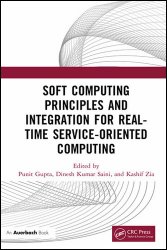Soft Computing Principles and Integration for Real-Time Service-Oriented Computing
- Добавил: literator
- Дата: 4-01-2024, 21:22
- Комментариев: 0
 Название: Soft Computing Principles and Integration for Real-Time Service-Oriented Computing
Название: Soft Computing Principles and Integration for Real-Time Service-Oriented ComputingАвтор: Punit Gupta, Dinesh Kumar Saini, Kashif Zia
Издательство: CRC Press
Год: 2024
Страниц: 263
Язык: английский
Формат: pdf (true)
Размер: 18.3 MB
In recent years, soft computing techniques have emerged as a successful tool to understand and analyze the collective behavior of service- oriented computing software. Algorithms and mechanisms of self- organization of complex natural systems have been used to solve problems, particularly in complex systems, which are adaptive, ever- evolving, and distributed in nature across the globe. What fits more perfectly into this scenario other than the rapidly developing era of Fog, IoT, and Edge computing environment? Service- oriented computing can be enhanced with soft computing techniques embedded inside the Cloud, Fog, and IoT systems.
Soft Computing Principles and Integration for Real-Time Service-Oriented Computing explores soft computing techniques that have wide application in interdisciplinary areas. These soft computing techniques provide an optimal solution to the optimization problem using single or multiple objectives.The book focuses on basic design principles and analysis of soft computing techniques. It discusses how soft computing techniques can be used to improve quality-of-service in serviceoriented architectures. The book also covers applications and integration of soft computing techniques with a service-oriented computing paradigm. Highlights of the book include:
- A general introduction to soft computing
- An extensive literature study of soft computing techniques and emerging trends
- Soft computing techniques based on the principles of Artificial Intelligence, fuzzy logic, and neural networks
- The implementation of SOC with a focus on service composition and orchestration, quality of service (QoS) considerations, security and privacy concerns, governance challenges, and the integration of legacy systems
- The applications of soft computing in adaptive service composition, intelligent service recommendation, fault detection and diagnosis, SLA management, and security
- Such principles underlying SOC as loose coupling, reusability, interoperability, and abstraction
- An IoT based framework for real time data collection and analysis using soft computing
Soft computing is an interdisciplinary field encompassing computational techniques inspired by biological systems, aiming to tackle complex problems that are difficult to solve using traditional methods. Unlike traditional computing, which relies on precise mathematical models and deterministic algorithms, soft computing embraces inherent uncertainty, imprecision, and incomplete information in real-world scenarios. Furthermore, by drawing inspiration from human-like intelligence and adaptive behavior, soft computing techniques offer powerful tools to address challenging problems across various domains.
Many real-world problems involve complex and non-linear relationships that traditional mathematical models cannot easily capture. However, soft computing techniques like neural networks and fuzzy logic, excel at discovering and representing these complex relationships. Neural networks can learn intricate patterns and correlations from data, enabling them to model highly non-linear relationships effectively. Fuzzy logic provides a flexible framework for handling vague and imprecise concepts, allowing for more nuanced and human-like reasoning in complex
problem domains.
Soft computing also collaborates with various intelligent techniques used. (1) neural networks (NNs); (2) fuzzy logic; (3) genetic algorithm; (4) decision tree; (5) case base reasoning; (6) Probabilistic Reasoning (PR); and (7) Evolutionary Computation (EC) and other techniques of soft computing.
Скачать Soft Computing Principles and Integration for Real-Time Service-Oriented Computing
Внимание
Уважаемый посетитель, Вы зашли на сайт как незарегистрированный пользователь.
Мы рекомендуем Вам зарегистрироваться либо войти на сайт под своим именем.
Уважаемый посетитель, Вы зашли на сайт как незарегистрированный пользователь.
Мы рекомендуем Вам зарегистрироваться либо войти на сайт под своим именем.
Информация
Посетители, находящиеся в группе Гости, не могут оставлять комментарии к данной публикации.
Посетители, находящиеся в группе Гости, не могут оставлять комментарии к данной публикации.
